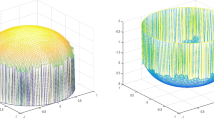Abstract
In this paper we investigate finite element approximation of optimal control problem governed by space fractional diffusion equation with control constraints. The control variable is approximated by piecewise constant. Regularity estimate for the control problem is proved based on the first order optimality system and a priori error estimates for the state, the adjoint state and the control variables are derived. Due to the nonlocal property of fractional derivative, which will leads to a full stiff matrix, we develop a fast primal dual active set algorithm for the control problem. Numerical examples are given to illustrate the theoretical findings and the efficiency of the fast algorithm.






Similar content being viewed by others
References
Benson, D.A., Wheatcraft, S.W., Meerschaeert, M.M.: The fractional order governing equations of Levy motion. Water Resour. Res. 36, 1413–1423 (2000)
Meerschaert, M.M., Sikorskii, A.: Stochastic Models for Fractional Calculus, De Gruyter Studies in Mathematics, vol. 43. Walter de Gruyter, Berlin (2012)
Mophou, G.: Optimal control of fractional diffusion equation. Comput. Math. Appl. 61, 68–78 (2011)
Mophou, G., N’Guérékata, G.M.: Optimal control of fractional diffusion equation with state constraints. Comput. Math. Appl. 62, 1413–1426 (2011)
Fujishiro, K., Yamamoto, M.: Approximate controllability for fractional diffusion equations by interior control. Appl. Anal. 93(9), 1793–1810 (2014)
Sprekels, J., Valdinoci, E.: A new type of identification problems: optimizing the fractional order in a nonlocal evolution equation. SIAM J. Control. Optim. 55, 70–93 (2017)
Ye, X.Y., Xu, C.J.: A spectral method for optimal control problem governed by the abnormal diffusion equation with integral constraint on the state. Sci. Sin. Math. 46, 1053–1070 (2016)
Ye, X.Y., Xu, C.J.: Spectral optimization methods for the time fractional diffusion inverse problem. Numer. Math. Theory Methods Appl. 6(3), 499–519 (2013)
Ye, X.Y., Xu, C.J.: A space-time spectral method for the time fractional diffusion optimal control problems. Adv. Differ. Equ. 2015, 156 (2015)
Li, S.Y., Zhou, Z.J.: Legendre pseudo-spectral method for optimal control problem governed by a time-fractional diffusion equation. Int. J. Comput. Math. 95(6–7), 1308–1325 (2018)
Zaky, M.A., Machado, J.A.T.: On the formulation and numerical simulation of distributed-order fractional optimal control problems. Commun. Nonlinear Sci. Numer. Simul. 52, 177–189 (2017)
Antil, H., Otárola, E.: A FEM for an optimal control problem of fractional powers of elliptic operators. SIAM J. Control Optim. 53(6), 3432–3456 (2015)
Antil, H., Otárola, E., Salgado, A.J.: A space–time fractional optimal control problem: analysis and discretization. SIAM J. Control Optim. 54(3), 1295–1328 (2016)
Antil, H., Otárola, E.: An a posteriori error analysis for an optimal control problem involving the fractional Laplacian. IMA J. Numer. Anal. 38(1), 198–226 (2017)
Antil, H., Otárola, E., Salgado, A.J.: Optimization with respect to order in a fractional diffusion model: analysis, approximation and algorithmic aspects. J. Sci. Comput. (2018). https://doi.org/10.1007/s10915-018-0703-0
Biccari, U., Hernández-Santamaría, V.: Controllability of a one-dimensional fractional heat equation: theoretical and numerical aspects. IMA J. Math. Control Inform. (2018). https://doi.org/10.1093/imamci/dny025
Zhou, Z.J., Gong, W.: Finite element approximation of optimal control problems governed by time fractional diffusion equation. Comput. Math. Appl. 71, 301–318 (2016)
Jin, B.T., Li, B.Y., Zhou, Z.: Pointwise-in-time error estimates for an optimal control problem with subdiffusion constraint, arXiv:1707.08808
Du, N., Wang, H., Liu, W.B.: A fast gradient projection method for a constrained fractional optimal control. J. Sci. Comput. 68, 1–20 (2016)
Wang, H., Wang, K.X., Sircar, T.: A direct \(O(Nlog N)\) finite difference method for fractional diffusion equations. J. Comput. Phys. 229(21), 8095–8104 (2010)
Ervin, V.J., Heuer, N., Roop, J.P.: Regularity of the solution to 1-D fractional order diffusion equations. Math. Comp. 87, 2273–2294 (2018)
Kunisch, K., Vexler, B.: Constrained Dirichlet boundary control in \(L^2\) for a class of evolution equations. SIAM J. Control Optim. 46(5), 1726–1753 (2007)
Ervin, V.J., Roop, J.P.: Variational formulation for the stationary fractional advection dispersion equation. Numer. Methods Partial Differ. Equ. 22, 558–576 (2006)
Jin, B.T., Lazarov, R., Pasciak, J., Rundell, W.: Variational formulation of problems involving fractional order differential operators. Math. Comp. 84, 2665–2700 (2015)
Bergounioux, M., Ito, K., Kunisch, K.: Primal–dual strategy for constrained optimal control problems. SIAM J. Control Optim. 37(4), 1176–1194 (1999)
Li, Y.S., Chen, H.Z., Wang, H.: A mixed-type Galerkin variational formulation and fast algorithms for variable-coefficient fractional diffusion equations. Math. Methods Appl. Sci. 40(14), 5018–5034 (2017)
Jia, L.L., Chen, H.Z., Wang, H.: Mixed-type Galerkin variational principle and numerical simulation for a generalized nonlocal elastic model. J. Sci. Comput. 71(2), 660–681 (2017)
Davis, P.J.: Circulant Matrices. Wiley, New York (1979)
Gary, R.M.: Toeplitz and circulant matrices: a review. Found Trends Commun. Inf. Theory 2, 155–239 (2001)
Gong, W., Hinze, M., Zhou, Z.J.: A priori error analysis for finite element approximation of parabolic optimal control problems with pointwise control. SIAM J. Control Optim. 52(1), 97–119 (2014)
Acknowledgements
The authors would like to thank the referees for their careful reviews and many valuable suggestions which have led to a considerably improved paper.
Author information
Authors and Affiliations
Corresponding author
Additional information
The research was supported by Natural Science Foundation of Shandong Province (No. ZR2016JL004, ZR2017MA020) and National Natural Science Foundation of China (No. 11301311, 11471196).
Rights and permissions
About this article
Cite this article
Zhou, Z., Tan, Z. Finite Element Approximation of Optimal Control Problem Governed by Space Fractional Equation. J Sci Comput 78, 1840–1861 (2019). https://doi.org/10.1007/s10915-018-0829-0
Received:
Revised:
Accepted:
Published:
Issue Date:
DOI: https://doi.org/10.1007/s10915-018-0829-0




